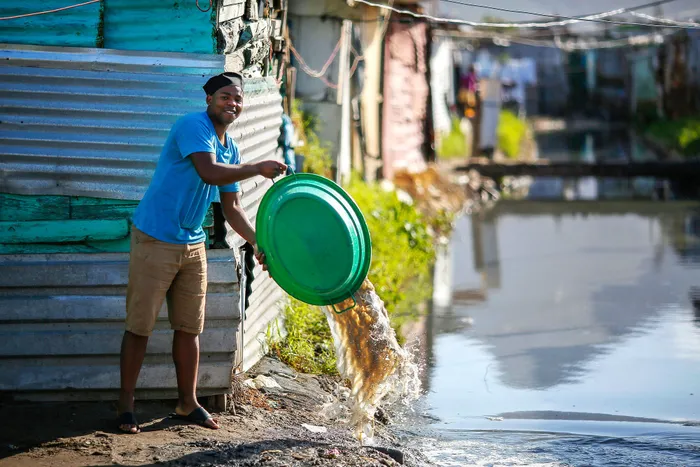Call for proper sanitation policy

UNSANITARY CONDITIONS: A resident discards waste water into a polluted waterway in Masiphumelele, Cape Town. The people of Masiphumelele have been battling for years to get proper sanitation, says the writer. Picture: EPA UNSANITARY CONDITIONS: A resident discards waste water into a polluted waterway in Masiphumelele, Cape Town. The people of Masiphumelele have been battling for years to get proper sanitation, says the writer. Picture: EPA
The Director of Environmental Law Enforcement in the Western Cape Government, Dr E Palmer, took a bold step and issued a directive in terms of the National Environment Management Act (Nema) 107 of 1998 on January 20 this year that gave legal muster to an important foundational right in our constitution - the right to human dignity.
We know about the court case the City of Cape Town lost when it erected open toilets in informal settlements after a two-year battle by residents. More than two years have passed but South Africa still has no sanitation policy that passes muster. For more than 10 years households living on the banks of six canals in the township of Masiphumelele (Masi) erven CA 945-25 and CA 945-ORE known as section Z in Noord/Fish Hoek in the Far South have battled with City officials for decent sanitation rights.
Their case was taken up by the Provincial Department of Health which led to Dr Palmer, the director of Environmental Law Enforcement, warning the City manager of Cape Town as a representative of the metro that the City was non-compliant with section 28(1) of the Nema and that he was liable to a fine of R10million or up to 10 years in jail if he did not:
Immediately undertake a thorough and effective clean-up operation of the six stormwater canals (with high faecal content) located in section Z.
Immediately remove stockpiles of solid waste.
Continue with such clean-up operations until otherwise directed by the department.
Diligently continue with regular maintenance of all toilets, washing facilities, standpipes, canals and all other stormwater and wastewater infrastructure and respond promptly and effectively to reported problems.
After an investigation, the director found that the City had failed to provide adequate ablution, washing and stormwater management facilities, as well as adequate solid-waste management practices - resulting in significant danger to the health and well-being of the inhabitants of Masiphumelele township.
Nema makes provision for the criminal prosecution of officials of a municipality.
Normally a pre-directive is issued, but the living conditions of the children and residents were so bad that an order was issued that required action within 14 days.
Hundreds of households live around canals which are like open toilets as the streams contain stagnant faecal night soil and the malfunctioning stormwater and sewer systems spill out sewage all over the place. This is especially profound around malfunctioning toilets as no proper janitorial service exists such as we find at the City’s transport hubs. I spent an afternoon in section Z and had to walk in sewage like all the kids and residents.
The City did spend nearly R1million to get off the hook and keep the City manager and his officials out of jail within the 14 days, but the jury is out as to whether it has complied with the full order.
In fact, Dr Palmer closed the case and when I put a question to the mayor in terms of the rules of order of the Council, she replied that the City got a letter on February 6 from his department that it was compliant with the Nema Act and that the matter was closed.
To test whether there is legal muster using the Nema Act around our sanitation rights, the Al Jama-ah political party laid a misconduct complaint against the Western Cape Environment and Development Planning Department with the public protector and the City’s Directorate of Informal Settlements, Water and Waste Services who, in spite of their best endeavours, don’t cut the mark to comply with the Nema
Act, especially in our informal settlements. The Directorate Environmental Law Enforcement also seems to be nothing more than a lame duck.
The party also brought the matter to the attention of Penny East, chairperson of the portfolio committee of area-based south services delivery 4, the speaker and the mayor’s office. Other stakeholders directly involved with service delivery, including the ward councillor and chairperson of the sub-council of Masiphumelele, were not informed as they’re adamant that all is well.
The party will further take up the non-compliance in council meetings and lobby for funds in the 2017/2018 City budget to be fully compliant. It has also requested a meeting with the mayor, whose diary has been full up to now after she recently returned from an overseas visit.
I believe up to five investigators from the public protector’s office, who are also working with the Human Rights Commission, which did little about complaints lodged a year ago by Masi residents, are on the case and their findings and remedial order will set the standards for a sanitation policy that will give meaning to sanitation rights in our constitution and of course help take residents of informal settlements out of their misery and terrible living conditions.
The public protector has confirmed her tweet that, on her inspection a fortnight ago, she found the living conditions in Masi the worst in South Africa.
This directive has largely gone unnoticed by sanitation activists as the Nema Act can be used to address sanitation issues worsened by perverse and inadequate budget allocations in the more than 200 informal settlements in the City and thousands of informal settlements all over South Africa. For Al Jama-ah, enforcing compliance with Nema is the first step to wiping out informal settlements in South Africa.